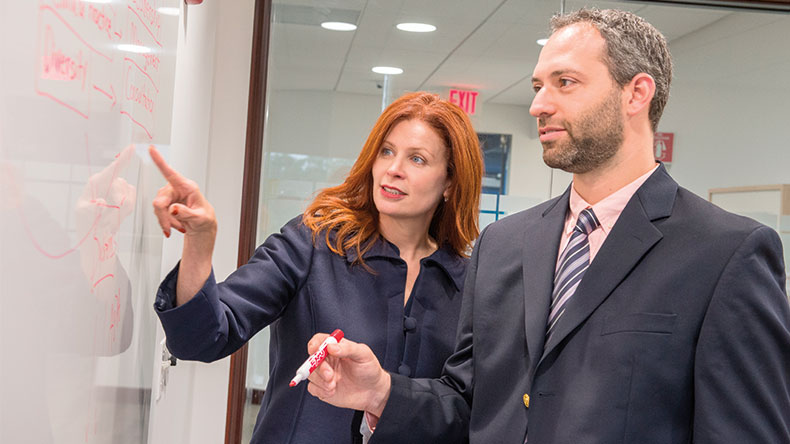Clinical Psychology Department Introduces Cutting-Edge Curriculum Changes

Stacey Lambert, chair, Clinical Psychology Department and associate vice president for Academic Affairs and Jason Osher, director, Neuropsychology Concentration, assistant professor, Clinical Psychology Department and chair, Curriculum Review Committee.
As the field of psychology evolves, the role of doctoral-level psychologists is changing. For many years, that role focused on providing long-term psychotherapy, often in private practice. Today, master’s-level clinicians provide similar services at lower rates, introducing competition into the market. At the same time, doctoral-level psychologists are being increasingly called on to serve in management roles and to become more involved in areas like preventative services and program evaluation.
“Psychotherapy is still an important part of the role of psychologists, but the one-on-one delivery is becoming a smaller segment of what we do,” explains Dr. Stacey Lambert, chair of the Clinical Psychology Department and associate vice president for Academic Affairs. “We need to also teach skills in these other areas like leadership and management.”
In addition, she notes that changes in the healthcare system are altering the delivery of services, particularly with pay-for-performance on the horizon. Limited treatment sessions, shorter-term empirically supported interventions, and outcome measurement are all part of this new landscape.
As a result of these changes, William James College recently updated the Doctorate of Clinical Psychology (PsyD) curriculum, adding classes in advanced competencies like leadership and management, understanding systems and psychologists’ role within systems, program evaluation and development, and consultation. The program is also adding substance abuse training.
“The future of psychology is changing, and we want to provide students with a foundation in these areas. A big part of our new curriculum is the insertion of these classes,” says Dr. Jason Osher, assistant professor in the Clinical Psychology Department, director of the Neuropsychology Concentration, and chair of the Curriculum Review Committee.
Lambert adds that these courses set William James College apart from other doctoral programs. “All American Psychological Association (APA) accredited programs have similar curriculums, but they aren’t required to offer these additional courses, which makes William James stand out.”
In addition, an important part of the curriculum update is a focus on integrating classes and Active Learning pedagogies. “Innovative learning pedagogies like case studies and simulations are widespread in other direct service fields like medicine, but not as common in psychology. We are integrating theory and practice for an applied learning experience,” says Osher, noting that these pedagogies focus on group work, collaboration, and sharing different perspectives.
The curriculum will also better integrate learning across competencies. Osher points to the clinical practice series as an example. The first-year class will focus on foundational skills like interviewing and establishing patient relationships. The second-year class will focus on clinical thinking skills, applying learning from other classes in areas like diversity, ethics, bio-bases of behavior, and psychopathology. Students will collaborate in groups on cases, learning from the professor and each other as they work through problems. The third-year class is a culmination of everything they’ve learned, with advanced case formulation, psychotherapy, and case assessments over longer periods of time.
“We’ve taken an explicit approach to breaking down the foundational skills, intermediate skills, and advanced integrative skills and how they fit in across the curriculum. William James is being innovative and pushing the envelope,” says Osher, noting that the program is also changing its research course sequence to better integrate student projects into the curriculum.
Lambert adds that “the future of psychology is going to look different and these curriculum changes ensure that William James College is at the forefront of educating psychologists. These changes are exciting and will prepare our students to take a broader view of the field and the opportunities that it holds.”
- Tags:
- Around Campus
Topics/Tags
Follow William James College
Media Contact
- Katie O'Hare
- Senior Director of Marketing
- katie_ohare@williamjames.edu
- 617-564-9389
